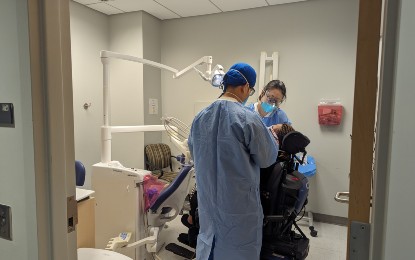Disability Justice and Awareness Month Highlight: Sydnee Chavis, DMD, MS
October 30, 2023 Micah Kleid
The School of Dentistry clinical assistant professor and the Special Care and Geriatrics Division focus on dental care and oral health for patients with disabilities and special needs.
Many people choose their professional careers because of their personal passions, including Sydnee Chavis, DMD, MS, a clinical assistant professor in the Special Care and Geriatrics Clinic at the University of Maryland School of Dentistry. Chavis specializes in advocating for people and patients with special needs and at a young age was inspired to pursue this calling by her older sister, Brandi.
"I really wanted to be in academia and specifically in special care because my older sister has some pretty significant special needs and disabilities, including cerebral palsy with some additional cognitive disabilities,” Chavis explained. “Growing up with her was such a gift for me and my siblings, seeing her be able to do so much and accomplish so much.
“But also, I remember from a very young age, seeing people stare at her or assume she couldn’t do things or talk about her in front of her. And then what also made a big impression on me was how difficult it was for my parents to find her care. I have very vivid memories of my parents having very heated discussions, crying, or arguing with people on the phone about trying to find her the right care, or schools, or programming. And as I got older, it became so apparent to me that if it was so difficult for my parents, who were educated and knew how to navigate the system and certainly had means to find care for her, how difficult must it be for anybody else?”
With these experiences and a desire to pursue a career in clinical health care, the path forward for Chavis was clear.
“Dentistry is the most unmet health care need for adults with disabilities and special needs, but I wanted to do more than just me seeing my own patients individually, so that is why I decided to go into academia,” Chavis said. “My hope is that if I can teach dental students or residents to feel comfortable or understand how to communicate with or relate to people with special needs who maybe are nonspeaking or don't necessarily communicate or interact in the way that most of the general population does, that it would have a broader effect on the health care needs of individuals with special needs and other cognitive disabilities.”
As a member of the Special Care and Geriatrics Division, which is housed within the Department of Oral Maxillofacial Surgery, Chavis and the other dentists and dental hygienists serve adults with special needs, intellectual and developmental disabilities, medical complexities, older adults, and any other patients who have difficulty accessing or obtaining dental care for any reason in a clinic that is dedicated to them and their needs.